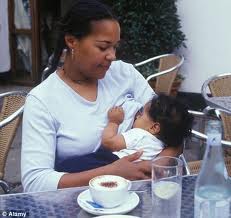 Babies are not able to metabolize or excrete caffeine very well, so a breastfeeding mother's consumption of caffeine may lead to caffeine accumulation and symptoms such as wakefulness and irritability, according to an interview with expert Ruth Lawrence, MD, published in Journal of Caffeine Research. The interview is available on the Journal of Caffeine Research website.
Babies are not able to metabolize or excrete caffeine very well, so a breastfeeding mother's consumption of caffeine may lead to caffeine accumulation and symptoms such as wakefulness and irritability, according to an interview with expert Ruth Lawrence, MD, published in Journal of Caffeine Research. The interview is available on the Journal of Caffeine Research website.
Caffeine is found in a wide range of products in addition to coffee, tea, and chocolate, including soft drinks, sports drinks, and some over-the-counter medications. In a provocative discussion with Dr. Ruth Lawrence, Department of Pediatrics, University of Rochester School of Medicine and Dentistry, Jack E. James, PhD, Editor-in-Chief of Journal of Caffeine Research, asks a variety of probing questions. Is there a safe level of caffeine intake while breastfeeding? Are there potential long-term effects of caffeine exposure on development and intellect? Can a baby whose mother consumed caffeine during pregnancy experience withdrawal if she then abstains from caffeine while breastfeeding? Dr. Lawrence bases her responses on the scientific and medical evidence related to caffeine exposure in breastfed babies, and distinguishes between what is and what is not well understood in this developing field of study.
"Usually a mother, particularly if she is breastfeeding, is cautioned to limit her caffeine intake," says Dr. Lawrence, who is Editor-in-Chief of the peer-reviewed journal Breastfeeding Medicine. After giving birth, mothers "should consume all things in moderation and try to avoid the excesses that might really add up to a lot of caffeine."
References:
*http://www.liebertpub.com/jcr
Citations:
Mary Ann Liebert, Inc./Genetic Engineering News. "Breastfeeding And Caffeine Consumption." Medical News Today. MediLexicon, Intl., 23 Feb. 2012. Web.
5 Mar. 2012. <http://www.medicalnewstoday.com/releases/241990.php>

Comments